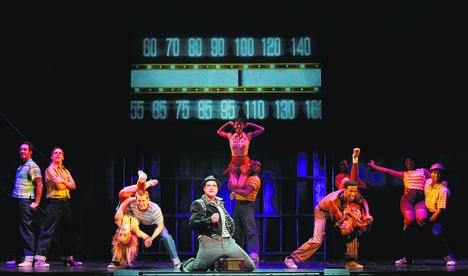
MEMPHIS by Joe DiPietro and David Bryan (Dancap). At the Toronto Centre for the Arts (5040 Yonge). To December 24. $51-$180. 416-644-3665, dancaptickets.com. See listing. Rating: NNN
Memphis is rarely more than middling.
David Bryan and Joe DiPietro’s musical about a Southern white guy in 1950s Memphis turned on by black music he ends up as a DJ, offering the music and its performers to an integrated audience. The show has some toe-tapping period numbers, but don’t look for any real insights here.
Huey Calhoun (Bryan Fenkart) discovers black music when he passes by a basement bar run by Delray (Quentin Earl Darrington), whose sister Felicia (Crystal Joy, subbing in for Felicia Boswell) is the club’s lead singer. Struck by both the music and Felicia, Huey does his best to popularize the black rhythm and blues melodies, first at the department store where he works and later as a radio DJ and a local concert producer.
You know that romance and radio success are coming up, though each will have its rocky moments. Just as surely, you can anticipate that Huey’s good Christian, segregationist mother (Julie Johnson) will come around to see her son’s point of view and that Delray’s bartender, Gator (Rhett George), mute since he saw his father hanged, will burst in song at the appropriate melodramatic moment.
The second half brings Huey, Felicia and the rest of the characters to television, where they try to integrate both the show and its audience. You’ll be reminded of Hairspray, except Memphis isn’t set in Baltimore and takes place several years earlier Hairspray made the same points about rock and integration in a more entertaining fashion.
Racial tensions and the appropriation of black music are sub-sub themes here, presented briefly and then pretty much left behind. Even Felicia’s drive for success is lamely explored.
So what succeeds? Bryan’s music, all original, suggests the styles of period greats like James Brown, Chubby Checker, Chuck Berry and others, and much of it is full of energy. Not everything pays off, including a forced church gospel number and Felicia’s solo Colored Woman, which should but doesn’t give us insight into a conflicted character. Joy does better with Felicia’s radio number, Someday, which has some emotional truth.
The cast is strong, especially Fenkart’s winning Huey. Darrington gives She’s My Sister more weight than the lyrics deserve, while Will Mann’s Bobby, initially a shy janitor, learns how to belt a song at just the right moment in front of the TV camera. Johnson’s mother has her own gospel number in the second act, Change Don’t Come Easy, which she sells with power to spare.
Best of all is Sergio Trujillo’s choreography, a survey of period dance styles performed by the entire company with joyous energy if you could go out whistling dance steps, you would.












